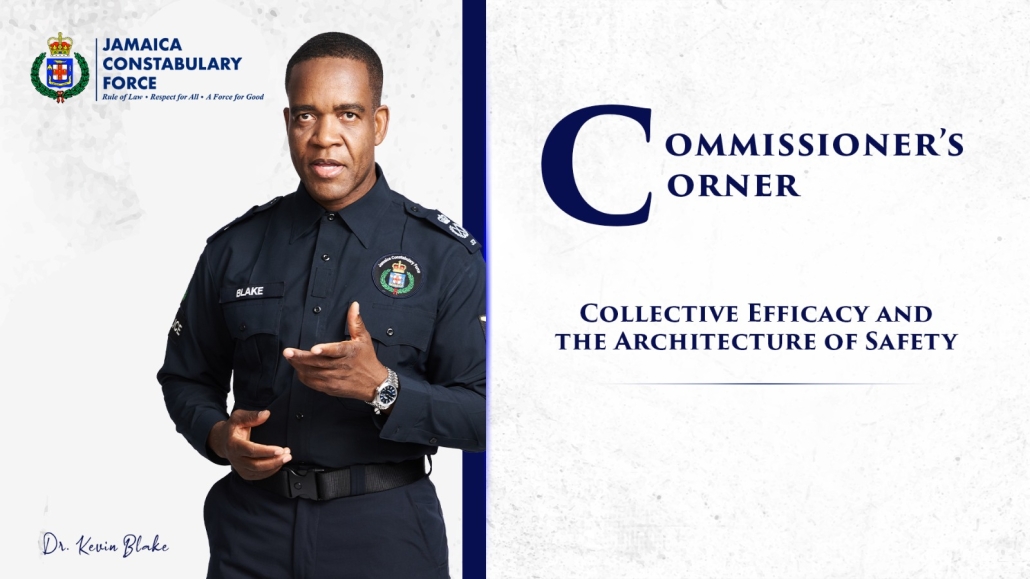
Collective Efficacy and the Architecture of Safety
Institutions are strongest when belief is not borrowed from authority but owned by those who serve within them. Commissioner Dr Kevin Blake’s most recent Commissioner’s Corner anchors itself in this truth. He does not describe a strategy. He articulates a shared disposition—what social theorists would call collective efficacy. The Jamaica Constabulary Force (JCF), under his leadership, is learning to treat belief not as rhetoric but as infrastructure.
Commissioner Blake writes that “Collective efficacy is the manifestation of a shared vision. It is us as a team working together in one accord, believing in the capacity of each other to deliver on a mandate that no single one of us can deliver by our self.” This is not motivational phrasing. It is structural language. The JCF’s mandate – to suppress crime, to deliver justice, to build national confidence – requires more than procedural compliance. It demands emotional investment and cultural coherence.
Collective efficacy explains why some organisations succeed under pressure while others fracture. It emerges not from hierarchy but from horizontal trust. When each officer believes in the intentions and capacities of their colleagues, cooperation becomes instinctive. When belief is present, supervision transforms into leadership. When belief is absent, rules become fragile.
The Commissioner’s call is timely. “It is a vision that we can fail to realize if it is one that we do not all share.” This is an urgent observation. Policing, especially in post-colonial democracies, often suffers from uneven legitimacy both within its ranks and in the eyes of the public. Shared vision is the corrective. It is the binding agent that turns fragmented duty into unified purpose.
To build such cohesion, the JCF is reaching inward. The Commissioner draws from social science, citing Herbert Kelman’s 1958 theory of social influence. “Social influence ranges on a continuum of behavioural changes from the superficial compliance, to the profound shifts in beliefs and values – internalization.” Kelman’s insight sits at the centre of institutional maturity. Compliance will produce short-term order. Internalisation will produce sustained reform.
The work of building collective efficacy is not spontaneous. It must be constructed through leadership clarity, cultural reinforcement, and strategic recognition. Dr Blake explains that, “This fundamental shift in beliefs, values and attitude in an organization that is as large, as old, and as complex as the JCF, requires consistent effort across several leaderships.” With this, the Commissioner affirms a crucial point: transformation is not attached to personality. It is tethered to culture. It must outlast any single command.
Leadership must be clear in what it expects and consistent in what it corrects. The Commissioner is unambiguous. “Let none of us sympathize with the miscreants among us when the consequences of their actions stare them in the face. Let us not subscribe to a dysfunctional interpretation of esprit de corps,” Commissioner Blake insists. This is institutional self-respect. It repositions accountability as a mechanism of belief, not betrayal. To protect the vision, one must be prepared to discipline those who threaten it.
The collective character of the JCF is becoming increasingly visible. This is not accidental. The Commissioner reports that during the recent CARICOM Heads of Government Meeting, Jamaica’s police force was named among the region’s leaders in transformation. “Very little words were spared in commending us for the transformation taking place within the JCF.” The compliment was unsolicited. Recognition of shared effort is the truest measure of cultural credibility.
Collective efficacy is not only internal. It transmits externally. Communities sense when officers act from shared purpose rather than mere assignment. Residents trust those who are trusted by their own organisation. The Commissioner envisions a future where violent crime no longer defines national consciousness. “There will come a time when violent crimes become so low that we do not have to worry about, or even doubt, its sustainability,” he said. Such a claim rests not on hope, but on structure—on the daily reproduction of belief across ranks and roles.
“Each day that we uphold our values with integrity, each decision we make that honours our commitment to service, brings us one step closer to becoming the professional force that our people deserve.” There is no policy that replaces that commitment. There is no training manual that substitutes for it. Integrity is learned through example. Service is sustained through shared intention.
In the end, collective efficacy is not a theory. It is a discipline. It is the daily execution of shared values in visible ways. The JCF’s future will not be determined by isolated acts of excellence. It will be shaped by the accumulation of consistent, collective belief. As our Commissioner quite rightly captures it, “The future we envision is not beyond our reach – it is being built by our hands, right now.”







